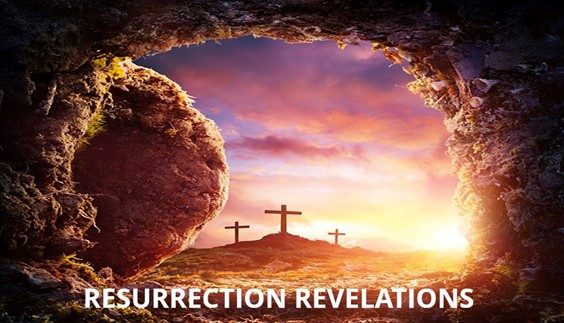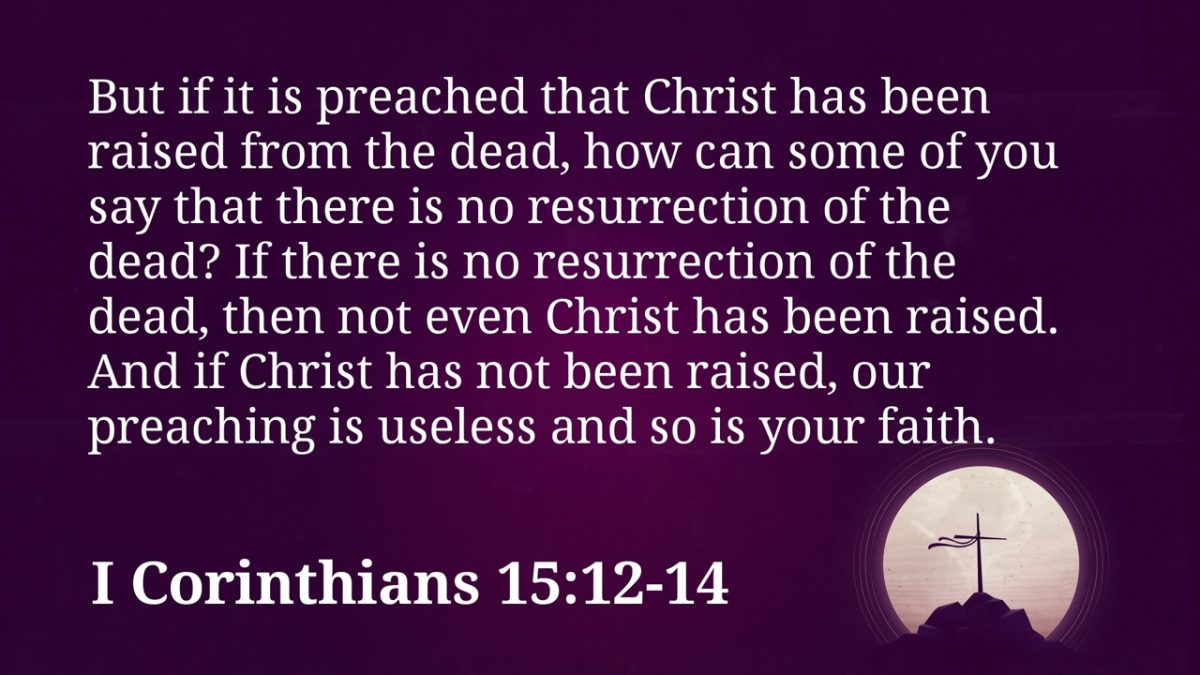Weekly Seed of Faith 10/8/2021
Seed of Faith – RESURRECTION REVELATIONS By Pastor Dave

“But Christ has indeed been raised from the dead, the firstfruits of those who have fallen asleep,: I Corinthians 15:20
Dear Faithful, Fearless & Fruitful Seed Sowers,
Greetings in the love and grace of our Lord and Savior, Jesus Christ. What a different world we find ourselves living in today–so very different from years past. I find great hope and peace in knowing this ONE THING: Jesus Christ is the same yesterday, today and forever (Hebrews 13:8). The world may be changing, your life and your family and your friends may be changing, our country may be changing, your schools and places of work may be changing but this one thing remains the same: JESUS CHRIST REMAINS THE SAME…yesterday…today…forever. From the Old Testament, how about holding onto Psalm 56:3, “When I am afraid, I put my trust in you.” (NIV) I am praying for you to find solid footing in the solid ROCK foundation of Jesus Christ.
Now, more than ever, is the time to MAKE TIME to read the living word of God! Why not start right now? All you need is a way to find the Scriptures–phone, bible, computer, etc. You don’t need a PhD, or a Masters of Divinity–all you need is the Word. Today, I am encouraging you to sit down, and read 1 Corinthians 15. As long as I have breath, I want to point you to the resurrection; we have a power within us that has defeated all other powers.
Recently, I worked a men’s retreat weekend back home in Illinois. The leader of the retreat blessed me with a book and on the inside he wrote, “Paul says, ‘I give to you the 3 most important things I know: 1. Christ died for your sins (crucifixion). 2. Christ was buried (in a borrowed tomb). 3. Christ rose from the dead (resurrection).’ THE GOSPEL IS THAT EASY!” If you don’t remember anything I say, remember those 3 things for upon these three things God has hung the stars and sun and planets, upon these 3 things God has formed the foundations of the world, upon these 3 things God has made a way for you and I to enjoy eternity.
Let’s look at this one chapter, 1 Corinthians 15.
What is Paul doing in this chapter? Paul is establishing a “So what?” argument. Remember Paul, the chief sinner saved by grace, is writing to the church in Corinth. The church in Corinth was teaching that there was no resurrection from the dead! Hey! Wait! Can you imagine Paul hearing this news? He sits down and pens this letter. “For I passed on to you first of all what I also received, that CHRIST died for our sins in accordance with the Scriptures (Isaiah 53:5-12), that Jesus was buried, that JESUS AROSE on the third day as the Scriptures foretold (Psalm 16:9, 10).”
Here’s what Paul is trying to tell us: If the resurrection does not exist in any way, shape or form, then the consequences to our Christian faith are devastating, empty, pointless, useless and in vain. Paul is stating: The resurrection is the hinge point of our faith—and the resurrection has to affect and change the ways we think and act.
“But if it is preached that Christ has been raised from the dead, how can some of you say that there is no resurrection of the dead? If there is no resurrection of the dead, then not even Christ has been raised. And if Christ has not been raised, our preaching is useless and so is your faith. More than that, we are then found to be false witnesses about God, for we have testified about God that he raised Christ from the dead. But he did not raise him if in fact the dead are not raised. For if the dead are not raised, then Christ has not been raised either. And if Christ has not been raised, your faith is futile; you are still in your sins.” 1 Corinthians 15:12-17
Resurrection Revelation
So What? What do these verses teach us today? Just a quick look around and it’s pretty easy to see that the world we live in has a sin problem–and here is where Paul is aiming.
Our sin-problem remains unsolved if Jesus did not rise from the dead.
The unanimous testimony of the Scriptures is that “the wages of sin is death” (Romans 6:24).
The reality is is that death will mark the end-result of our separation from God.
Here is the point that Paul is driving home: If Jesus stayed dead, there are only two possible conclusions–
First, Jesus was not the sinless person everyone thought Him to be and His death marked His final separation from God.
Second, Jesus might have been without personal sin but His attempts to atone for the sin of the world by His death did not meet with divine approval of God.
If Jesus stayed dead–then we are dead in our sin.
Paul was never a man of few words, chapter 15 illustrates this for us! I love verse 32, “If the dead are not raised at all, let us eat and drink, for tomorrow we will be dead. DO NOT BE DECEIVED!” Paul continues by ending this chapter with the HOPE (heaven’s one promise…eternity) we all need hope planted firmly in our hearts: “We shall not all fall asleep in death, but we shall all be changed in a moment, in the twinkling of an eye, at the last trumpet call. For a trumpet will sound and the dead will be raised imperishable (free from decay) and we shall be changed!” (verses 52,53) Paul, the Old Testament scholar, now quotes Isaiah 25:8, ” Death is swallowed up in victory” and from Hosea 13:14, “O death, where is your victory? O death,, where is your sting?”
Paul’s preaching is on fire in this chapter. He writes because he wants us to remember the most important things he knows. Paul, who has written prolifically–at least 13 letters in the Bible–boils it all down to what he knows as the HINGE PIN of life:
1. Jesus died.
2. Jesus was buried.
3. Jesus rose.
If Paul were on THE VOICE, he’d drop the mic.
Your homework this week: Do you believe Jesus died? Do you believe Jesus was buried in a borrowed tomb? Do you believe Jesus rose from the dead? If you believe these three things then this world has no scare in it for you. Like I wrote to open this SEED OF FAITH, the world is changing but one thing will never change.
JESUS CHRIST IS THE SAME…YESTERDAY…TODAY…FOREVER.
Make that a breath prayer for when you are afraid: JESUS, I TRUST IN YOU. JESUS, YOU ARE THE SAME, YESTERDAY, TODAY, FOREVER.
I love my job. As crazy as it sounds, I love to tell people whose loved ones have died–the moment they drew their last breath on earth, they were safely home in heaven held in the loving arms of Jesus. Bring on that trumpet call, I’m going home in the twinkling of an eye.
See you Sunday!
God loves you and so do I,
Pastor Dave
www.theseedchristianfellowship.com



